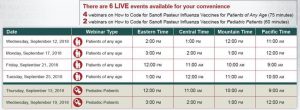IAC Express
The American Journal of Preventive Medicine published a study by Sylvia Becker-Dreps et al. titled Effectiveness of Prenatal Tetanus, Diphtheria, Acellular Pertussis Vaccination in the Prevention of Infant Pertussis in the U.S. The abstract is reprinted below.
Introduction
It is recommended that all pregnant women in the U.S. receive tetanus, diphtheria, acellular pertussis (Tdap) immunization to prevent infant pertussis. This study’s objective was to examine the clinical effectiveness of prenatal Tdap, and whether effectiveness varies by gestational age at immunization.
Methods
A nationwide cohort study of pregnant women with deliveries in 2010–2014 and their infants was performed. Commercial insurance claims data were analyzed in 2016–2017 to identify Tdap receipt by the pregnant women, and hospitalizations and outpatient visits for pertussis in their infants until the infants reached 18 months of age. Pertussis occurrence was compared between infants of mothers who received prenatal Tdap (overall and stratified by gestational age at administration) and infants of unvaccinated mothers.
Results
There were 675,167 mother–infant pairs in the cohort. Among infants whose mothers received prenatal Tdap, the rate of pertussis was 43 percent lower (hazard ratio=0.57, 95% CI=0.35, 0.92) than infants whose mothers did not receive prenatal or postpartum Tdap; this reduction was consistent across pertussis definitions (hazard ratio for inpatient-only pertussis=0.32, 95% CI=0.11, 0.91). Pertussis rates were also lower for infants whose mothers received Tdap during the third trimester. Infants whose mothers received Tdap at <27 weeks of gestation did not experience reductions in pertussis rates (hazard ratio for pertussis=1.10, 95% CI=0.54, 2.25).
Conclusions
Infants of mothers who received prenatal Tdap experienced half the rate of pertussis as compared with infants of unimmunized mothers. These results do not provide evidence to support changing the currently recommended timing of Tdap administration in pregnancy.
Access the complete article: Effectiveness of Prenatal Tetanus, Diphtheria, Acellular Pertussis Vaccination in the Prevention of Infant Pertussis in the U.S.

